Seemingly born out of the live animal market in Wuhan, China, the coronavirus has exploded into an international pandemic. China quarantined millions of people and basically shut down its economy. Italian leaders grounded flights, suspended mortgage payments, and cleared streets with mandatory lockdowns. Trump unilaterally banned all travel from European countries.
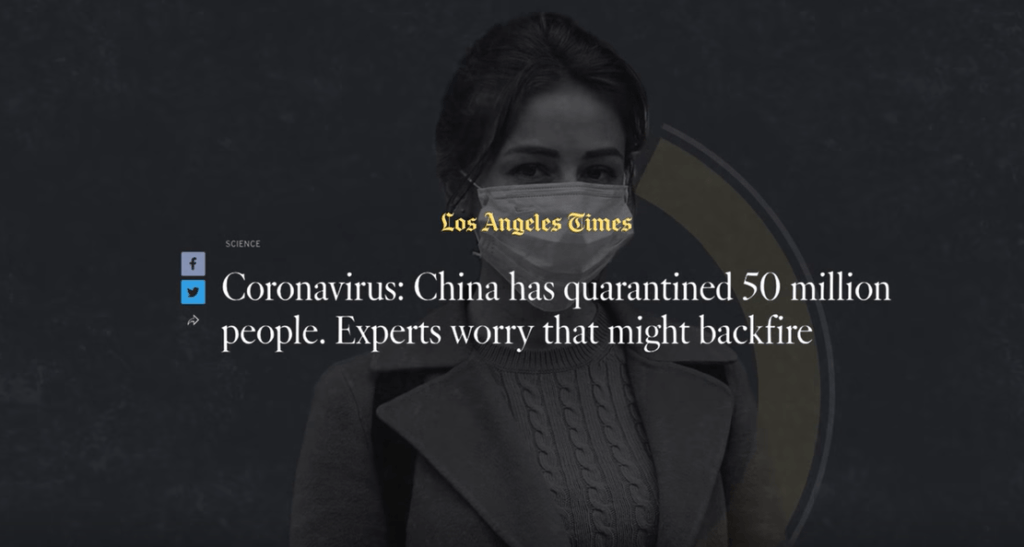
Swift and drastic action seems to be following in the footsteps of COVID-19, and as someone who spends most of their time grappling with the spectre that is climate change, I can’t help but notice the stark contrast in the global response between climate change and the coronavirus.
Our Changing Climate series
This post is part of a new series created by ethical.net in partnership with Our Changing Climate: an environmental YouTube channel that explores the intersections of social, political, climatic, and food-based issues. Get early access and support this important research by becoming a Patreon.
What can we learn from the response to COVID-19?
Today I want to dig into this difference with a simple question: what can we learn from the response to COVID-19 and how can we apply it to climate change? First of all, the coronavirus (or COVID-19) is a serious global issue. At the time of writing this, the global death toll has reached over 4,700 and will no doubt continue to rise.
In the face of this crisis, the news media has gone haywire – exhaustively covering the virus with constant coverage of death tolls and quarantines. Yet in contrast, an environmental problem like air pollution, which has been estimated to cause 4.5 to 7 million premature deaths every year rarely makes headlines.
So, instead of adding to the barrage of coronavirus coverage, I want to use the global response to COVID-19 as a tool to understand the best approach to spurring immediate climate action. Because, let’s face it, if we responded to the threat of climate change the way we have to the coronavirus, we would be well on our way to a zero-carbon future.
Understanding the differences between the two crises
Before we can dive into this analysis, however, we must first understand the differences between the two crises. And the starkest contrast between the two has to do with time.
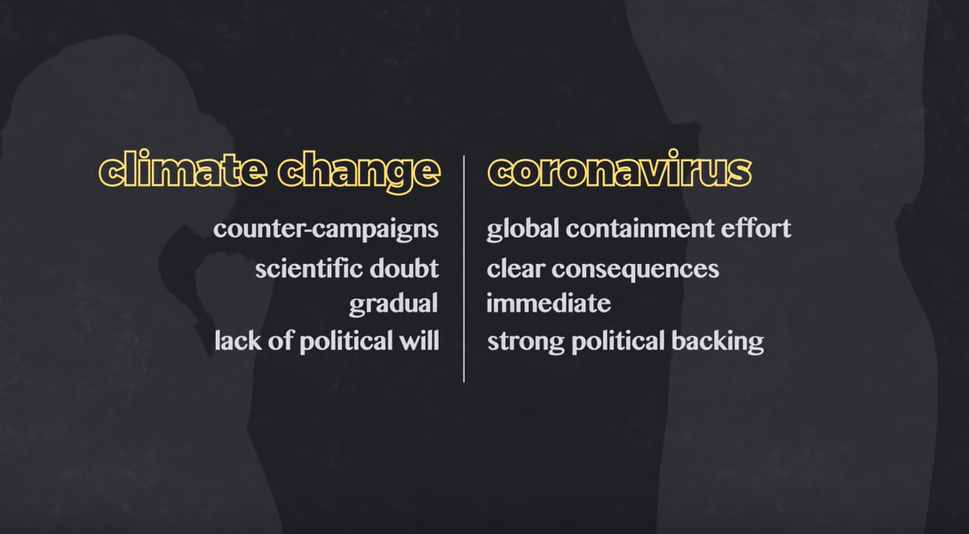
While climate change slowly builds – becoming a catastrophic threat over the course of decades – coronavirus is immediate and right in our face. As a result, climate change research and evidence is more easily called into doubt, making it much harder for global leaders to act confidently and swiftly on environmental issues.
Coronavirus
Coronavirus, on the other hand, sprung up quickly, and there’s a very clear connection between cause and effect.
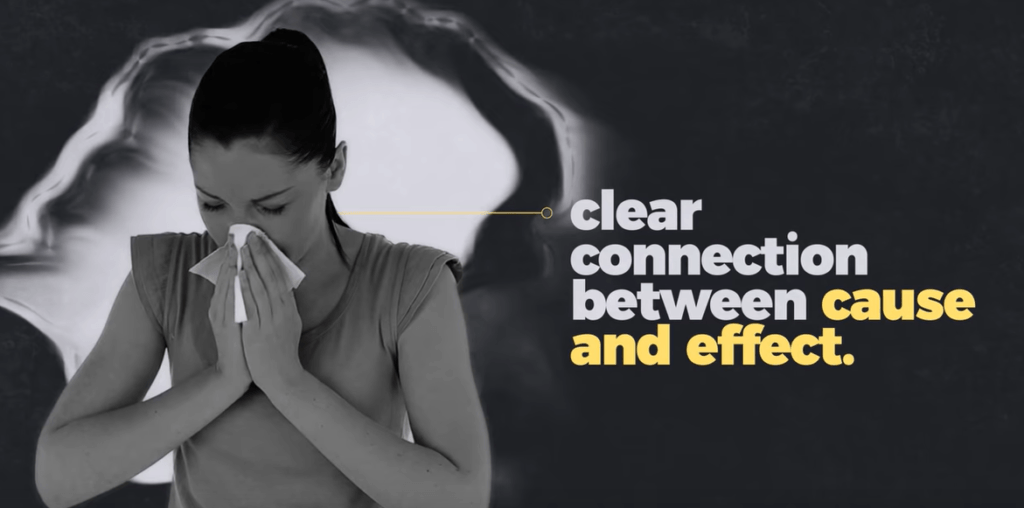
We know that it’s a virus that travels through respiratory droplets produced when a person coughs or sneezes. With this knowledge, we are then able to draw a clear line between actions and consequences.
We know for sure that washing your hands and quarantines will directly hinder the spread of the virus.
Climate change
Climate change, however, is not so simple. This is due to not only its gradual timeline and scale, but also to the successful obfuscation campaigns run by fossil fuel giants like ExxonMobil. At first glance, it seems like there is no direct line between taking action and seeing change.
My fellow YouTuber Climate Adam put it best, in his own video on the coronavirus:
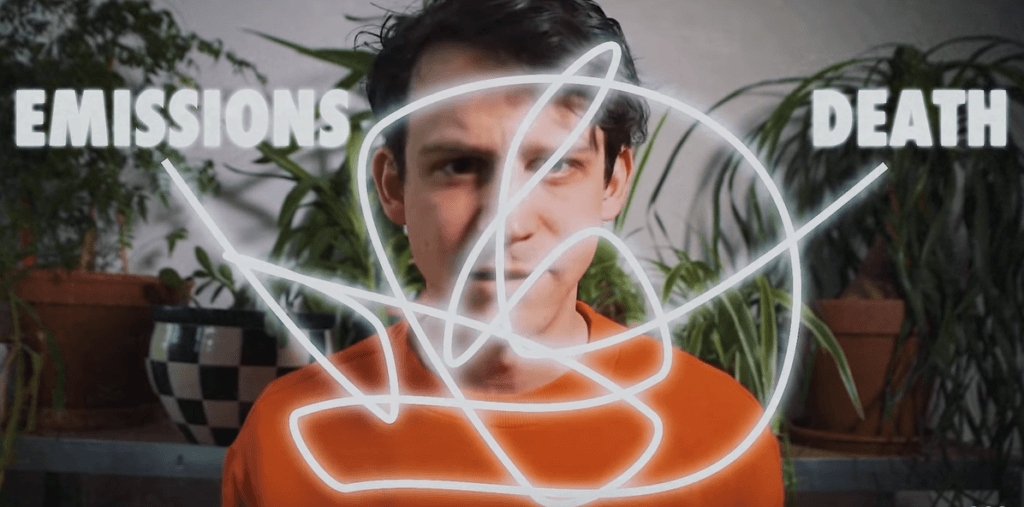
“[C]limate change certainly is costing lives today, but the link between a particular death and between our emissions is long and tangled. Yes, of course, from one example climate change is making certain extreme weather events more likely, raising the risk of death either directly from that extreme event or indirectly through things that extreme event contributes to, but compare that to this statement: coronavirus has already cost over a thousand lives. That second statement is so much more direct and so is our response to it.”
Short-term clear-and-present dangers
In short, there are not only more incentives for those with power to stymie climate action than there are to prevent the coronavirus. We are also more psychologically and structurally equipped to deal with short-term clear-and-present dangers like coronavirus, and less able to tackle multi-decade problems like climate change.
Despite these differences, and in some ways because of these differences, there is a lot to learn from how we’ve responded to COVID-19.
Takeaways
One of the big takeaways is that there is a very clear connection between emissions rates and the economy. ☁️
Emissions rates and the economy
This NASA satellite image shows the steep drop in nitrogen dioxide air pollution during the sharp decline in economic activity resulting from China’s rapid and aggressive response to the coronavirus.
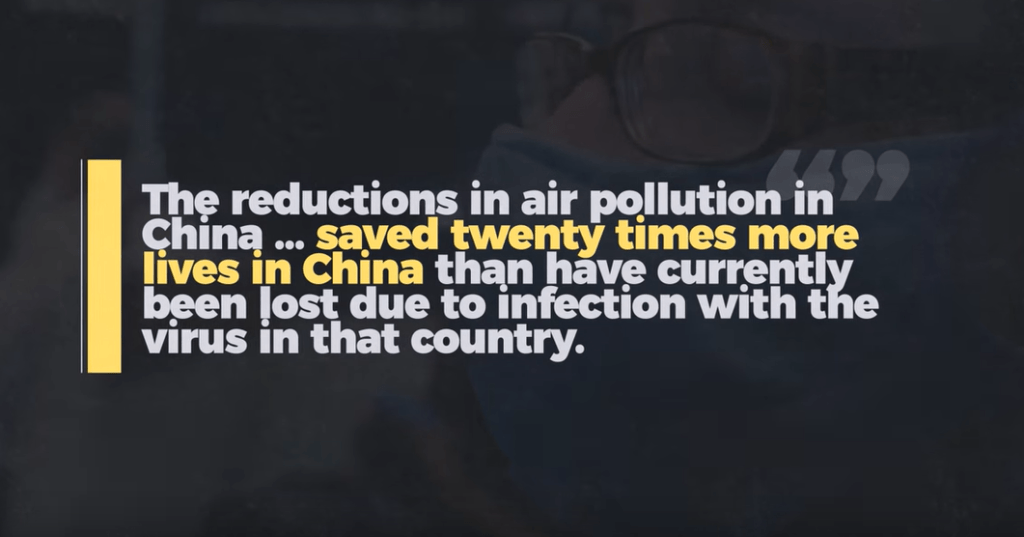
Carbon Brief asserts that China’s coronavirus shutdown temporarily decreased the country’s CO₂ emissions by a quarter, which Stanford professor Marshall Burke predicts might have reduced the number of premature deaths due to air pollution. So much so that China’s overall mortality rate might have decreased in the two months during the height of the coronavirus shutdowns.
👉 The point here, as Burke notes, is not that pandemics are good or necessary, it’s instead that there is a large, hidden toll of fossil fuel emissions here and now.
But to prevent the millions of future deaths caused directly through burning fossil fuels or indirectly through the consequences of a hotter planet, the world needs to act quickly to create rapid and drastic structural change.
The often-quoted Intergovernmental Panel on Climate Change report asserts that we have until 2030 to make sharp global emission cuts, which many argue is impossible.
Luckily, we’ve just seen that it’s not.
The coronavirus definitively shows that collective, large-scale, structural change is feasible in the face of a crisis. And climate change is the biggest crisis of our generation.
As Amy Jaffe, director of the Council on Foreign Relations’ Energy Security and Climate Change program, puts it, “Suppose you were a policymaker, and you were thinking about what you would do to lower emissions – you just got a pretty good instruction.”
Because of the coronavirus, countries like Italy have almost done away with travel; many previously busy streets are now free of cars.
Work weeks are shortening for some, others are embracing the potential of video chat and messaging software instead of travelling long distances, and some companies have staggered work shifts to reduce traffic.
Temporary bike lanes were set up all over New York City, and walking and biking were encouraged over other transportation options.
Planned economic slowdowns
Of course, the answer to climate change is not to quarantine everyone in their homes; that would be an absolute disaster. The response to the coronavirus demonstrates that planned economic slowdowns are not only possible but necessary to cut emissions drastically.
But this type of fast structural change shows that without robust social safety nets – like a clean jobs guarantee, extensive free public transit, or a strong low-carbon, low-cost public housing system – degrowth will harm millions.
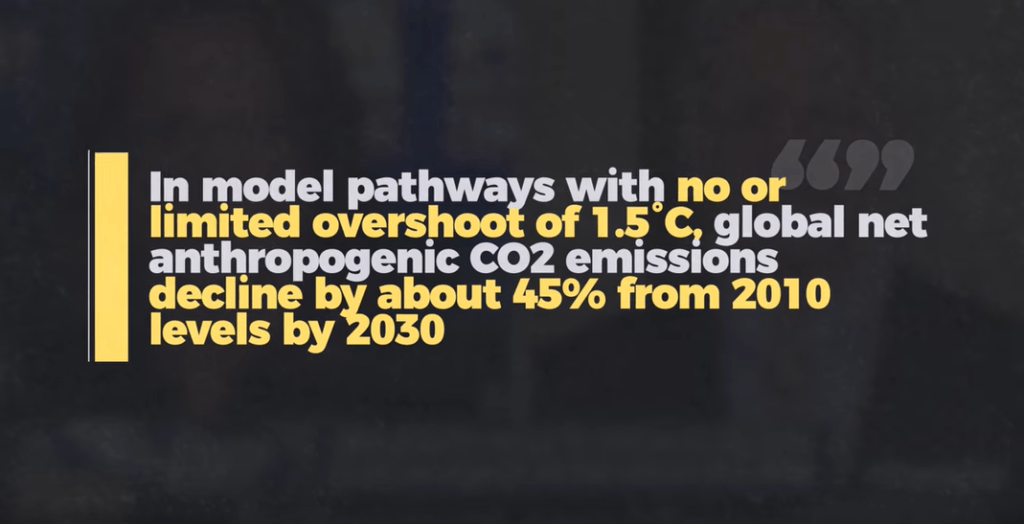
Climate action propositions like the Green New Deal need to incorporate this type of essential framework in their policymaking, because to combat climate change quickly we need a rapid structural transition. A break from the status quo. But what’s key is that this slowdown doesn’t have to mean job loss, worry, and pain; it can instead mean opportunity, free time, and a more intentional, quality-driven economy.
Conclusion
In short, coronavirus shows us that the rapid emissions reductions called for in the IPCC report are not a pipe dream: they can happen, and are happening.
👉 The virus demonstrates that to garner support for this necessary action we need to treat climate change as what it really is: a crisis.
But it also shows us one more thing: that the reduction needed in emissions through degrowth has to be coupled with strong safety nets, like healthcare and childcare for all, to catch those affected by an economy-wide transition to a fossil-fuel-free world.
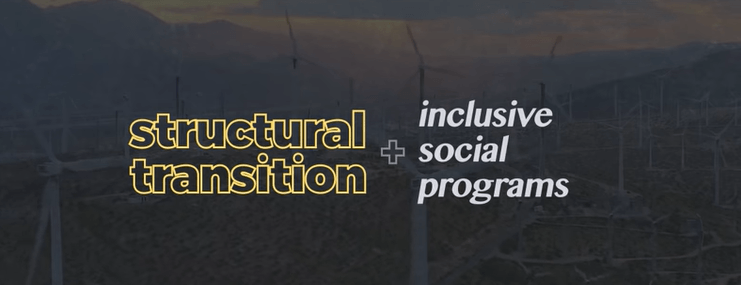
COVID-19 is scary and is affecting the whole world, but if we don’t act in the same way about climate change, the effects of a hotter planet will be much worse. The coronavirus response has shown us a path forward; we just have to have the courage to break from the status quo and follow it.
Watch the video essay here ⤵️
Resources:
1. Coronavirus Could Slow Efforts to Cut Airlines’ Greenhouse Gas Emissions (NY Times)
2. Coronavirus ‘Really Not the Way You Want To Decrease Emissions’ (InsideClimate News)
3. ‘Almost Without Precedent’: Airlines Hit Hard by Coronavirus (NY Times)
4. Different Crises: Coronavirus & Climate Change (Climate Adam via YouTube)
5. Why don’t we panic about climate change like we do coronavirus? (Market Watch)
6. How broadcast TV networks covered climate change in 2019 (Media Matters)
7. What Coronavirus Teaches Us About Climate Change (New York Magazine)
8. Coronavirus and climate change: A tale of two crises (DW)
9. Coronavirus should give us hope that we are able to tackle the climate crisis (Phys.org)
10. The Psychology of Coronavirus vs. Climate Change: Why We Mobilize for One, Not the Other (WTTW)
11. What next for the coronavirus response? (The Lancet)
12. The Wuhan Coronavirus, Climate Change, and Future Epidemics (Time)
13. COVID-19 reduces economic activity, which reduces pollution, which saves lives. (Marshall Burke via G-Feed)
14. Analysis: Coronavirus has temporarily reduced China’s CO2 emissions by a quarter (Carbon Brief)
15. Toxic Air: The Price of Fossil Fuels (Greenpeace)
16. The critical role of second-order normative beliefs in predicting energy conservation (Jachimowicz et al.)
17. The Fed’s $1.5 trillion loan injection because of coronavirus, explained (Vox)
18. Traffic Index – Live congestion statistics and historical data (TomTom)
19. Coronavirus Capitalism — and How to Beat It (The Intercept via YouTube)
20. The Politics of Coronavirus (PolyMatter)


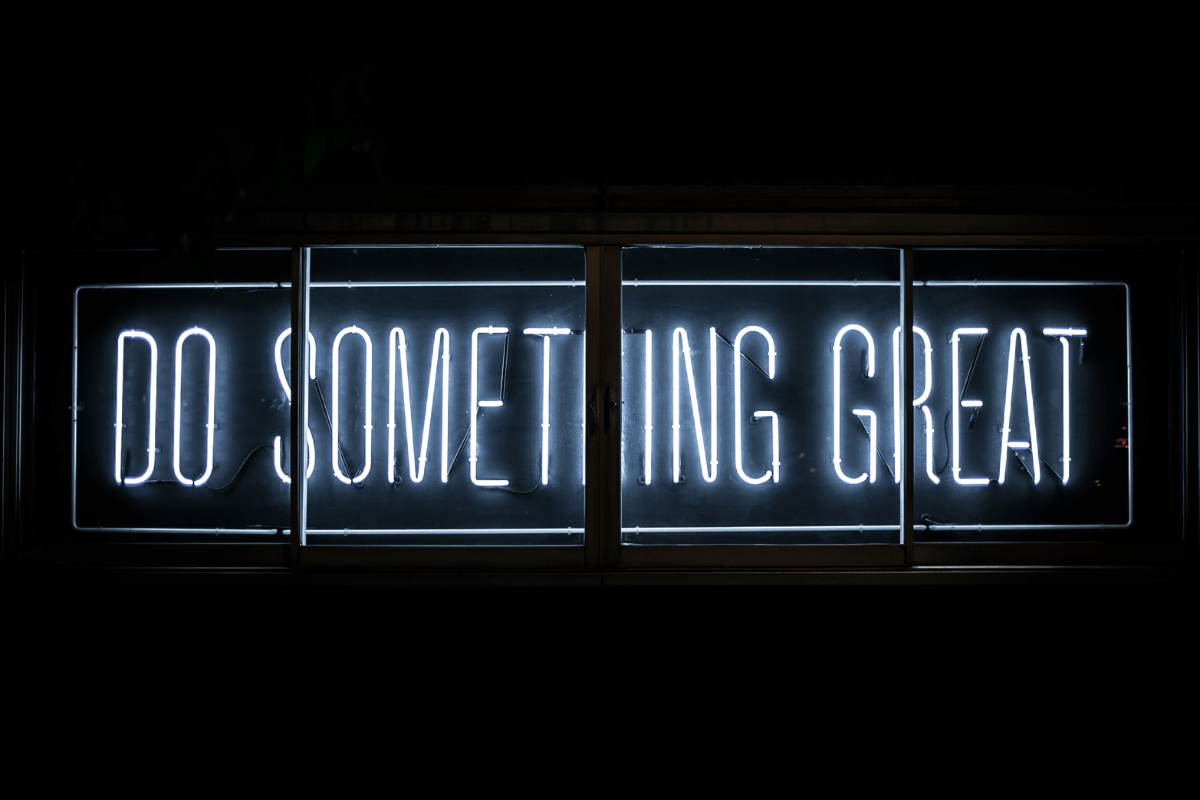
Leave a Reply